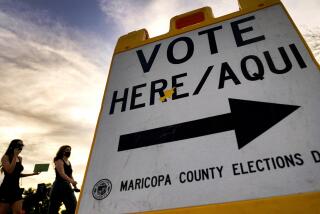Non-residents have no right to a state’s records, court rules
WASHINGTON — Americans do not have a right to obtain public records from states other than their own, the Supreme Court ruled Monday, dealing a setback to businesses and researchers who gather data across the nation.
The unanimous decision upheld laws in Virginia and a handful of other states that release some public records only to their own citizens.
“This is disappointing. We have a national information economy now, and all sorts of activities depend on data from all 50 states,” said Washington attorney Deepak Gupta, who represented two men who had challenged the “citizens only” provision of Virginia’s public records law.
Despite the ruling, Gupta said the trend has been for states to open their public records on an equal basis. Only two other states — Arkansas and Tennessee — decline to do so, he said. “It’s not realistic for states to wall off their public information,” he said.
Roger Hurlbert, a Northern California man who runs a business obtaining hard-to-find real estate records, sued to challenge Virginia’s law. He was joined by Mark McBurney, a Rhode Island man who wanted to know why the Virginia agency that enforces payments of child support had been slow in processing a payment from his former wife, who lived in Virginia.
They sued after their requests for documents were denied. They contended that Virginia’s preferential treatment for its own citizens violated their rights under the U.S. Constitution, which says: “The citizens of each state shall be entitled to all privileges and immunities of citizens in the several states.” They were joined by news media organizations and ethics watchdog groups that argued for free and easy access to public records.
In rejecting the claim, the high court said the Constitution does not require states to treat out-of-state residents as though they were state residents. The justices noted that states typically charge higher fees for out-of-staters who seek a license to hunt or fish or to enroll in a state university.
Justice Samuel A. Alito Jr. said the privileges and immunities of U.S. citizens refer to “fundamental” rights, not “incidental” matters like obtaining local real estate assessments. Virginia’s law is not unconstitutional “simply because it has the incidental effect of preventing citizens of other states from making a profit by trading on information obtained in state records,” he said in McBurney vs. Young.
Alito added that public records laws have a special purpose. They permit citizens to hold their government “accountable.” They also require state agencies to “foot the bill” for gathering and releasing requested records, he said. Since a state’s taxpayers are paying the bill, it is reasonable to limit the benefit to them as well, he said.
In reaction, Hurlbert said he would “abandon” doing business in Virginia. “I’ve been doing this for 40 years, and I’ve gotten around to most of the states,” he said. “I gather records — property taxes, assessments and the like — that others have difficulty getting.”
Along the way, he said, he has filed more than 50 lawsuits, most of them in state courts, seeking to open public records. “It’s gotten much better over the years,” he said. “But there are still a few restrictive laws out there.”
More to Read
Inside the business of entertainment
The Wide Shot brings you news, analysis and insights on everything from streaming wars to production — and what it all means for the future.
You may occasionally receive promotional content from the Los Angeles Times.










